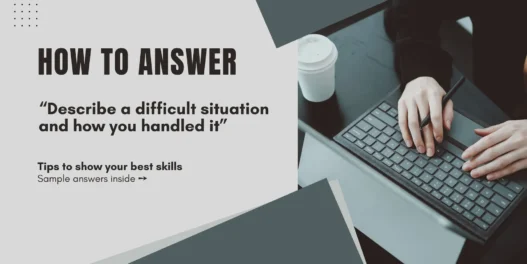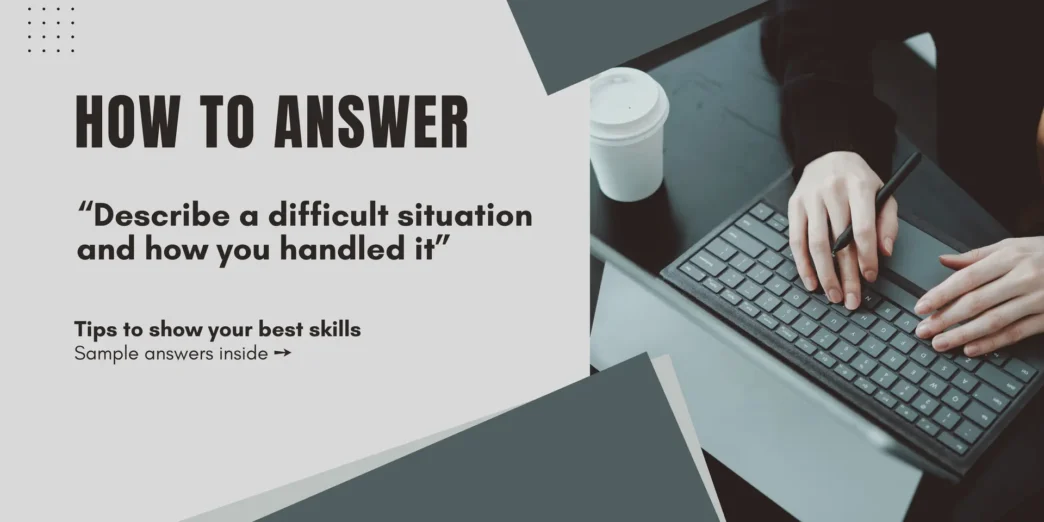Job interviews can be nerve-wracking, especially when faced with challenging questions. One common and tough question interviewers often ask is, “Tell me how you handled a difficult situation.” It’s a behavioral interview question that provides insight into your problem-solving skills, resilience, and ability to stay calm under pressure. This article will guide you through how to answer this question effectively, giving you the best chance to impress your potential employer.
Why Employers Ask About Difficult Situations in Job Interviews
Employers ask about challenging situations to assess key qualities that make you a strong employee. They want to understand:
- How you handle pressure: Can you stay calm and find solutions when things go wrong?
- Your problem-solving skills: How do you identify problems and come up with solutions?
- Your adaptability: How do you adjust to unexpected challenges or changes?
By answering this question, you showcase not only your work skills but also your emotional intelligence and ability to handle workplace stress. It’s an opportunity to show that you’re not only capable of handling challenges but that you also learn and grow from them.
Step-by-Step Guide to Answering “Tell Me How You Handled a Difficult Situation”
Answering this common interview question doesn’t have to be stressful. Here’s a simple framework to help you craft a strong, impactful response:
1. Pause and Reflect Before Answering
Take a moment to think about a situation where you successfully navigated a difficult challenge. Choose an example that is relevant to the job you’re applying for, ideally one that showcases your core competencies. A brief pause to reflect allows you to collect your thoughts and respond clearly and confidently.
2. Focus on a Specific Example
Employers are looking for real-world examples, not abstract answers. Use a particular situation where you faced a tough challenge and successfully overcame it. The more specific you are, the more compelling your answer will be.
Example:
“I once worked on a project with tight deadlines, and our team faced several unexpected obstacles. I knew we needed to meet the deadline, so I quickly prioritized tasks, delegated responsibilities, and communicated regularly with team members to ensure we stayed on track. Ultimately, we completed the project ahead of schedule.”
3. Explain the Problem Clearly
Start by briefly explaining the difficult situation you faced. Avoid going into too much detail about the problem. Instead, focus on the challenge itself and how it impacted your work or the team. Keeping it concise helps the interviewer focus on the action and solution rather than getting bogged down in the problem.
Example:
“The client was unhappy with the quality of our initial work, and they threatened to cancel the contract. This was a major concern for the company, as we relied heavily on this client.”
4. Describe Your Actions and Problem-Solving Process
Now, explain how you handled the situation. This is where you demonstrate your problem-solving skills, ability to act quickly, and resourcefulness. Make sure to highlight the steps you took and the decisions you made.
Use phrases such as:
- “I took the initiative to…”
- “I evaluated the situation by…”
- “I collaborated with my team to…”
Example:
“I immediately reached out to the client to understand their concerns. After listening attentively, I proposed several solutions and worked with my team to implement a new strategy that addressed their needs. By offering a tailored solution, we not only salvaged the relationship but also exceeded their expectations.”
5. Highlight the Positive Outcome
End your response by explaining the positive result of your actions. Employers want to see that your efforts paid off and that you were able to turn a challenging situation into a success.
Example:
“As a result of our quick turnaround, the client decided to continue working with us. In fact, they gave us a referral to another potential client, which led to new business for the company.”
6. Reflect on What You Learned
Incorporate a key learning from the situation. Discuss how it helped you grow professionally or how you improved your skills as a result. This shows that you’re committed to personal and professional development.
Example:
“This experience taught me the importance of proactive communication and the value of understanding the client’s needs from the outset. It also helped me improve my time management skills, as we had to manage the changes under tight deadlines.”
Additional Tips for Answering “Tell Me How You Handled a Difficult Situation”
To further refine your answer and impress your interviewer, consider these expert tips:
7. Be Honest but Positive
While it’s essential to be truthful about the challenges you faced, try to keep the tone of your response positive. Don’t dwell on failures, but rather focus on how you handled the situation and what you learned from it.
8. Avoid Overly Personal Situations
While it’s okay to mention personal struggles, try to focus on professional challenges that are more relevant to the job you’re applying for. This ensures that your answer remains appropriate for a work setting.
9. Tailor Your Response to the Job
Every job is different, so consider the specific requirements and responsibilities of the position you’re applying for. Choose examples that demonstrate skills and qualities relevant to the role, such as leadership, problem-solving, teamwork, or communication.
Examples of How to Answer “Tell Me How You Handled a Difficult Situation” by Industry
Here are some tailored examples for different industries to help you craft your own response:
Engineering
Example:
“As part of a bridge construction project, we encountered an issue with unstable ground and a wide river. Rather than giving up, I suggested an alternative plan to build two smaller bridges on either side and connect them. This solution not only saved the project but also completed it within the designated timeframe and budget.”
Customer Service
Example:
“A customer was very dissatisfied with a delayed order. I calmly listened to their concerns, apologized, and immediately arranged for expedited shipping. I kept the customer updated throughout the process and offered a discount on their next purchase. They were extremely appreciative, and we retained their business.”
Marketing
Example:
“Our team was tasked with launching a campaign with a tight deadline. However, several team members fell ill unexpectedly. To ensure the campaign still launched on time, I stepped up to manage the tasks of others, coordinated with external partners, and worked extended hours. The campaign went live as planned and exceeded performance expectations.”
Final Thoughts: Turning Challenges into Opportunities
By following this guide, you can effectively answer the interview question, “Tell me how you handled a difficult situation,” and impress employers with your problem-solving skills, resilience, and positive attitude. Remember to stay calm, focus on the solution, and highlight what you learned.
Now that you know how to handle this tricky interview question, it’s time to prepare for your next interview! Reflect on past challenges, and practice articulating your experiences in a clear, concise, and positive way. A great answer to this question can set you apart from other candidates and help you land your next job.
Start preparing today by reviewing potential challenges you’ve overcome, and craft responses that showcase your skills and professional growth. With a well-prepared answer, you’ll be ready to impress any interviewer with your ability to handle tough situations with grace and confidence.


















